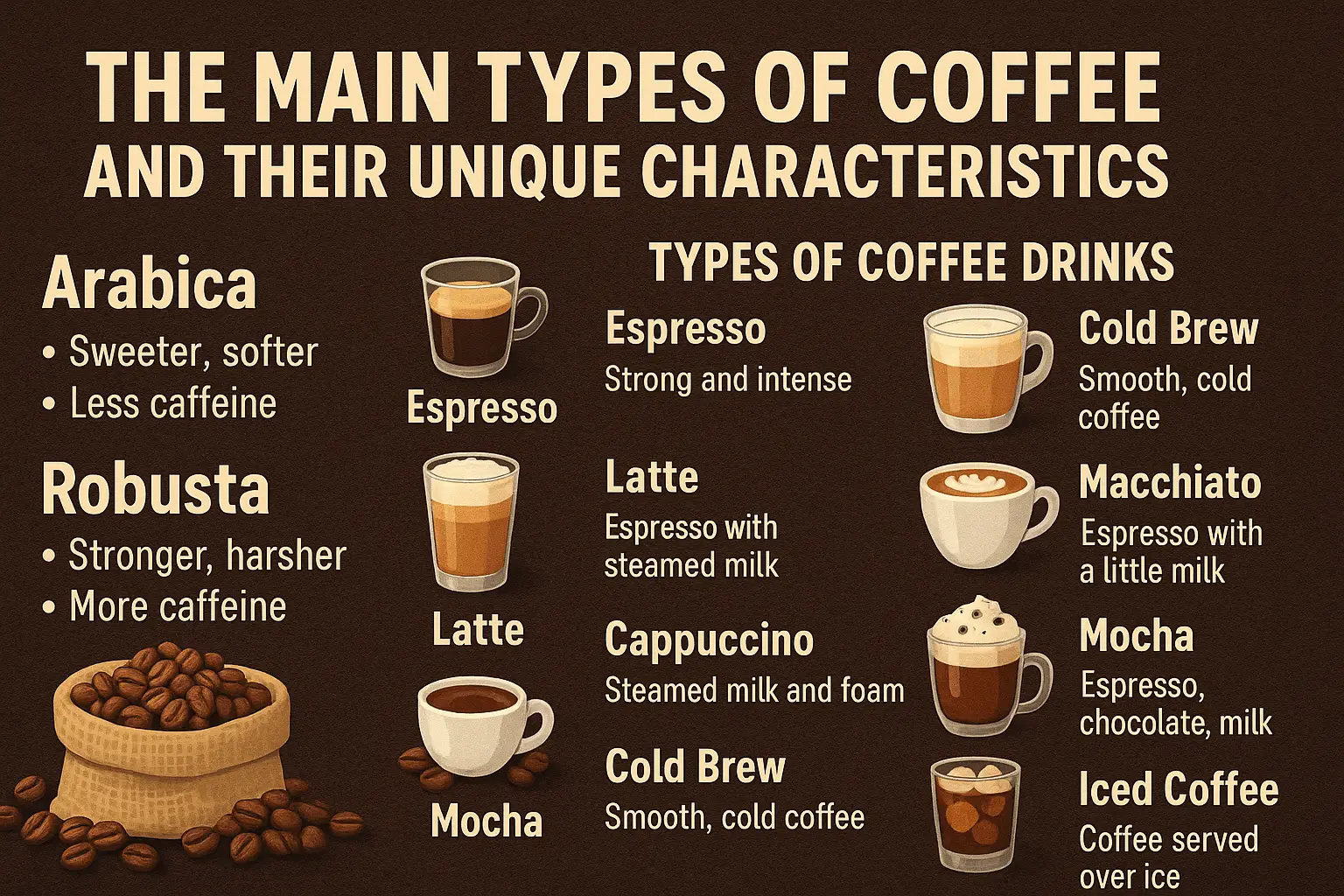Coffee isn’t just one drink — it’s an entire world of flavors, origins, and preparation styles. From bean species to brewing methods, understanding the different types of coffee can help you enjoy better cups and discover new favorites. In this guide, we’ll break down the main types of coffee by species, drinks, and preparation techniques.
Arabica vs. Robusta: The Two Main Coffee Species
Arabica (Coffea arabica)
Arabica beans are the most widely consumed coffee type in the world, making up about 60–70% of global production. Grown at higher altitudes and in cooler climates, Arabica is valued for its smooth flavor and balanced acidity.
Key traits of Arabica:
- Softer, sweeter flavor with hints of fruit, sugar, or flowers
- Less caffeine (about 1.2% average)
- More complex aroma and taste
- More expensive due to its delicate growing conditions
Where it’s grown: Brazil, Colombia, Ethiopia, Central America
Robusta (Coffea canephora)
Robusta is hardier, more pest-resistant, and often used in commercial coffee blends and instant coffee. It’s bolder, more bitter, and packs a stronger caffeine punch.
Key traits of Robusta:
- Stronger, harsher taste with earthy or nutty notes
- Higher caffeine content (about 2.2%)
- More crema in espresso, making it popular in espresso blends
- Grows at lower altitudes, making it cheaper and more robust
Where it’s grown: Vietnam, Indonesia, parts of Africa
Other Less Common Varieties
- Liberica: Grown in Southeast Asia, offers a smoky, woody flavor with a full body.
- Excelsa: A rare variety with tart, fruity notes, sometimes blended with other beans.
Types of Coffee Drinks: A World of Choices
Espresso
The foundation of many coffee drinks. A small, concentrated shot made by forcing hot water through finely ground coffee under pressure.
- Flavor: Strong, intense, bold
- Commonly used in: Lattes, cappuccinos, macchiatos, mochas
Americano
A shot of espresso diluted with hot water. Similar strength to drip coffee but with the boldness of espresso.
- Flavor: Smooth, mild bitterness
- Perfect for: Those who find espresso too strong but prefer its flavor over regular brewed coffee
Latte
Espresso mixed with steamed milk and topped with a small layer of foam.
- Flavor: Creamy, mild coffee flavor
- Good for: Milk lovers and beginners
Cappuccino
Equal parts espresso, steamed milk, and foam. Richer and foamier than a latte.
- Flavor: Balanced, creamy, slightly stronger than a latte
Macchiato
Espresso “stained” with a little milk or foam. Stronger than a latte or cappuccino.
- Flavor: Intense coffee with a hint of creaminess
Flat White
Similar to a latte but with a higher ratio of espresso to milk and finer microfoam.
- Flavor: Smooth, velvety, stronger than a latte
Mocha
Espresso with chocolate syrup or cocoa, steamed milk, and sometimes whipped cream.
- Flavor: Sweet, dessert-like, chocolatey
Cold Brew
Coffee brewed slowly with cold water over 12–24 hours. Less acidic and smoother than hot-brewed coffee.
- Flavor: Smooth, sweet, low bitterness
- Great for: Hot weather or those with sensitive stomachs
Iced Coffee
Traditional brewed coffee that is cooled and poured over ice.
- Flavor: Depends on the beans and method; more bitter than cold brew
Brewing Methods and Their Effects
Drip Coffee (Filter)
Hot water slowly drips through a paper filter filled with ground coffee. Standard in American homes.
- Flavor: Clean, light to medium body
French Press
Ground coffee is steeped in hot water and then separated by a plunger.
- Flavor: Full-bodied, rich, and oily
Pour Over (V60, Chemex)
Manually pouring hot water over coffee grounds in a cone-shaped filter. Requires precision.
- Flavor: Clean, bright, and layered
Espresso Machine
Forcing hot water through finely ground coffee under high pressure.
- Flavor: Strong, concentrated, with crema
AeroPress
A manual method using air pressure to brew coffee quickly.
- Flavor: Smooth, low-acid, versatile
Moka Pot (Stovetop Espresso)
Uses steam pressure to push water through coffee grounds.
- Flavor: Bold, rich, close to espresso
Choosing the Right Coffee Type for You
The perfect coffee type depends on your personal taste and routine. Ask yourself:
- Do you prefer strong or mild coffee?
- Do you enjoy hot or iced drinks?
- Do you like your coffee black or with milk/sugar?
- Are you open to experimenting with different beans or brew methods?
Here are some recommendations:
- For strong coffee lovers: Try espresso, Moka pot, or French press
- For smooth drinkers: Go with pour-over or cold brew
- For those who like milk-based coffee: Choose lattes, cappuccinos, or flat whites
Final Thoughts: Explore and Enjoy
There’s no one-size-fits-all answer to “the best” type of coffee. The beauty of coffee lies in its variety. Whether you prefer a quick shot of espresso, a slow drip brew, or a creamy mocha, there’s always more to explore.
Start by learning the differences in bean species and preparation styles, and don’t be afraid to experiment. The next coffee you fall in love with might be one you’ve never tried before.
